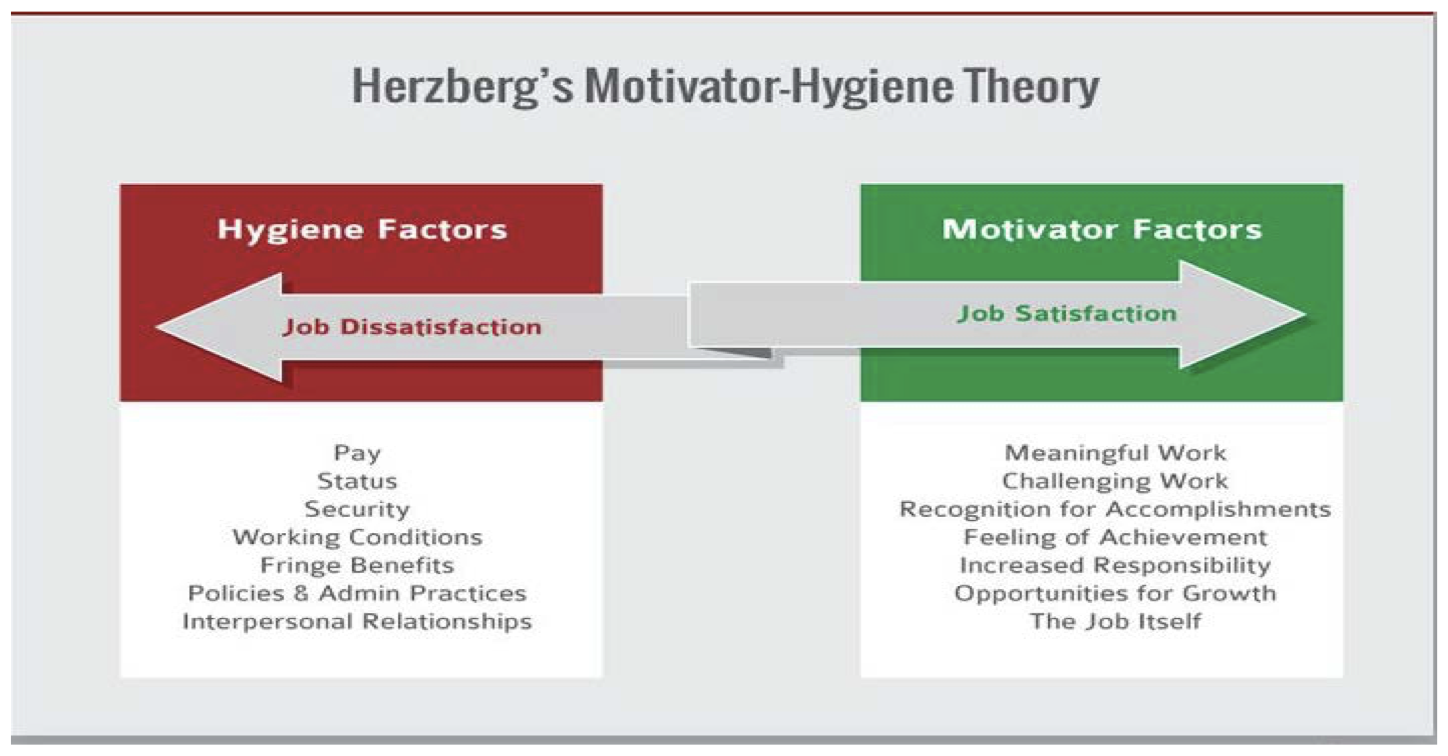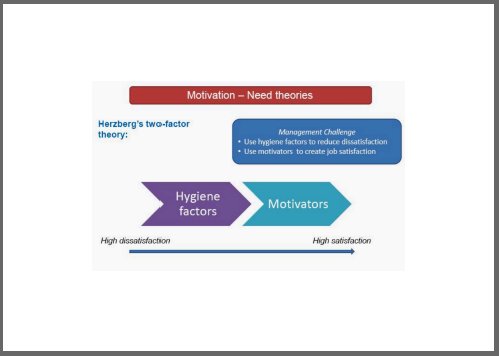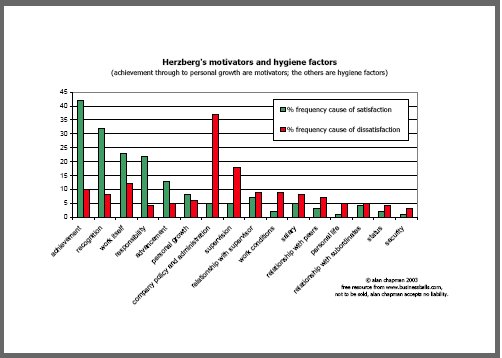|
Herzberg Motivation TheoryHow hygienic is your change initiative?Are your people satisfied and motivated?
Herzberg Motivation Theory is the work of Frederick Irving Herzberg [1923 - 2000], who was an American psychologist who is most famous for introducing job enrichment and the Motivator-Hygiene theory. His 1968 publication "One More Time, How Do You Motivate Employees?" had sold 1.2 million reprints by 1987 and was the most requested article from the Harvard Business Review.
Here is Herzberg [filmed in the 70s] explaining his theory.
Hygiene TheoryHerzberg motivation theory proposes the Hygiene Theory, also known as the Two Factor Theory of job satisfaction.
Motivator Factors
Hygiene Factors
The Herzberg motivation theory was based around interviews with 203 American accountants & engineers in Pittsburgh, chosen because of their professions' growing importance in the business world. The subjects were asked to relate times when they felt exceptionally good or bad about their present job or any previous job, and to provide reasons, and a description of the sequence of events giving rise to that positive or negative feeling. The proposed hypothesis in the Herzberg motivation theory appears verified. The factors that led to satisfaction [achievement, intrinsic interest in the work, responsibility, and advancement] are mostly unipolar; that is, they contribute very little to job dissatisfaction. Conversely, the dis-satisfiers [company policy and administrative practices, supervision, interpersonal relationships, working conditions, and salary] contribute very little to job satisfaction.
Unlike Maslow, who offered little data to support his ideas, Herzberg and others have presented considerable empirical evidence to confirm the Herzberg motivation theory.
He proposed several key findings as a result of this identification:
Practical Application of Herzberg Motivation Theory to change leadership and managementImpact on change initiative programme planning At the planning stage of a change initiative, and especially when reviewing the full impact of the change initiative on the people who will be affected by it, Hygiene theory [just as with ERG theory] informs the stakeholder mapping and analysis process and influences the communication strategy. It focuses change leaders on the impacts of these 2 dimensions of human needs - motivators and dissatisfiers. Leadership and communication Again, as with ERG Theory, from a change management and change leadership perspective, understanding and recognising these needs can influence and shape a communication strategy and a leadership style. There will be circumstances where, in the interests of business survival - such as in major restructuring and business turnarounds where redundancies and major change to working practises are announced - that neither sets of needs are going to met particularly well, or even at all. People are flexible and will adjust and accept this - at least for a while - is if it is communicated honestly and accurately and if leadership is acting effectively by addressing the emotional dimension. It is my view that the framing or positioning of a situation by the change leader is extremely important – especially in knowing how to focus and present a communication about a difficult situation with lots of dissatisfiers in such a way that it does address motivation factors needs at the earliest opportunity. I say this because in my view, people will be more likely to tolerate difficult circumstances if they are led well and in such a way that their aspirational and higher motivational needs are addressed. I am not talking about “spin” deception or any other form of manipulation here, rather I am referring to a leadership style that is based on the qualities and characteristics of transformational leadership and primal leadership, and that takes full and honest account of the impact of change on people and especially acknowledges and leads them through the transitions that they have to move through if the change is to be successful. In my view, a key change leadership skill is knowing how to make the "judgement call" on how and when to communicate to people news that in terms of Herzberg motivation theory is going to dissatisfy them and demotivate them. And - here's the key to this I feel - having the capacity to "reframe" the situation fairly quickly in such a way that people's motivation needs [or at least some of them] are addressed.
Further Resources
Motivation Theories - Getting people to take action Maslow's hierarchy of needs - A paradigm shift ERG Theory - Practical application to leading change Acquired Needs Theory - Goal seeking achievers Process theories of motivation - Personal needs drive behaviour Employee motivation techniques - How to achieve peak performance Myers Briggs Personality Types - Why so importantInspirational motivation - How to inspire your people in tough times Return from Herzberg Motivation Theory to "Define Motivation"
|



 According to his theory, people are influenced by
According to his theory, people are influenced by 





